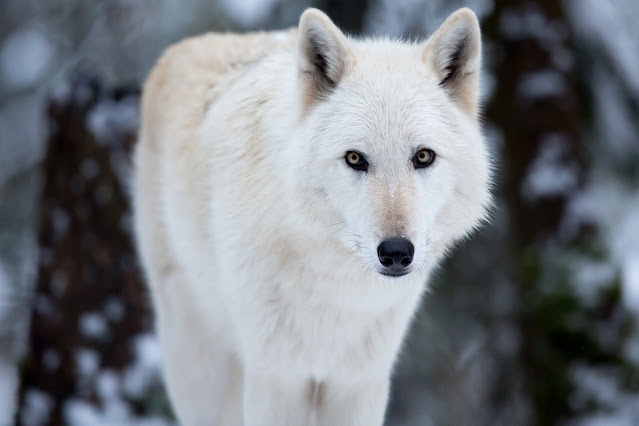Posted by Gigi Allianic, Communications
Photos by Jeremy Dwyer-Lindgren and Dennis Dow Woodland Park Zoo
 |
| Kaya on Living Northwest Trail in 2023 |
Woodland Park Zoo is mourning the loss of a female gray wolf named Kaya (KAI-yuh). The 13-year-old passed away while under anesthesia for a diagnostic procedure at the zoo’s veterinary hospital.
In human care, the median life expectancy is 11–12 years old. At 13 years old, Kaya was a geriatric wolf.
Woodland Park Zoo has been home to gray wolves for more than 70 years. Kaya arrived at the zoo in 2010 along with three of her sisters, all 1 year old at the time. Only one wolf, Shila (SHY-lah), a sister of Kaya, remains at the zoo; two of their sisters passed away over the last couple of years.
Shila lives in the Living Northwest Trail, which is also home to the new Canada lynx, brown bears, snowy owls, elk, river otters, western pond turtles and more wildlife native to the Pacific Northwest.
“For more than seven decades, gray wolves have always remained a favorite for visitors. It’s a great loss for our zoo family. We’re going to miss Kaya deeply,” said Erin Sullivan, an animal curator at Woodland Park Zoo.
In human care, the median life expectancy is 11–12 years old. At 13 years old, Kaya was a geriatric wolf.
Woodland Park Zoo has been home to gray wolves for more than 70 years. Kaya arrived at the zoo in 2010 along with three of her sisters, all 1 year old at the time. Only one wolf, Shila (SHY-lah), a sister of Kaya, remains at the zoo; two of their sisters passed away over the last couple of years.
Shila lives in the Living Northwest Trail, which is also home to the new Canada lynx, brown bears, snowy owls, elk, river otters, western pond turtles and more wildlife native to the Pacific Northwest.
“For more than seven decades, gray wolves have always remained a favorite for visitors. It’s a great loss for our zoo family. We’re going to miss Kaya deeply,” said Erin Sullivan, an animal curator at Woodland Park Zoo.
 |
| Beautiful Kaya, we will miss you. |
According to Dr. Tim Storms, director of animal health at Woodland Park Zoo, Kaya became acutely lame on her left rear limb and a growth was noted by the animal care team. “We anesthetized her for diagnostic assessment and discovered a very large, invasive mass consistent with an aggressive tumor that was causing severe swelling and pain. Radiographs confirmed the severity of the tumor and also identified a pulmonary lesion consistent with a probable metastatic tumor. “After considering surgical and treatment options we were discussing euthanasia due to a grave prognosis, when cardiac arrest occurred and she passed away,” explained Storms.
As a standard procedure, the zoo’s animal health team will perform a postmortem exam to further diagnose factors that may have contributed to Kaya’s death.
On a global level, the gray wolf is widespread. But in the United States, gray wolves were nearly eradicated. Thanks to teamwork between government organizations, nonprofits, Indigenous Peoples and private landowners, gray wolves have started to make a comeback.
As a standard procedure, the zoo’s animal health team will perform a postmortem exam to further diagnose factors that may have contributed to Kaya’s death.
On a global level, the gray wolf is widespread. But in the United States, gray wolves were nearly eradicated. Thanks to teamwork between government organizations, nonprofits, Indigenous Peoples and private landowners, gray wolves have started to make a comeback.
 |
| The sister pack in 2014 on Living Northwest Trail |
Wolves are a classic example of both a recovery species and a coexistence species in Washington state.
Woodland Park Zoo supports the recovery of wolves across Washington state as part of the state’s natural biological community and bio-cultural heritage. See the zoo’s policy statement on wolves issued in 2021 here.
Pay your tribute to Kaya by leaving a memory on our Facebook, Instagram or Twitter posts, you can also:
Woodland Park Zoo supports the recovery of wolves across Washington state as part of the state’s natural biological community and bio-cultural heritage. See the zoo’s policy statement on wolves issued in 2021 here.
Pay your tribute to Kaya by leaving a memory on our Facebook, Instagram or Twitter posts, you can also:
- Adopt a gray wolf through the zoo’s ZooParent program, which supports the zoo’s animal care, education and wildlife conservation efforts in the Pacific Northwest and around the world.
- Learn more about how to advocate for and coexist with Northwest carnivores at zoo.org/nw/carnivores
- Consider becoming a monthly donor. Your monthly gift supports more than 800 animals at Woodland Park Zoo as they connect with millions of guests each year, educating, engaging and inspiring environmental action. Help share the story of these animals and the existential threats they face while helping to give them the best quality of life possible.


Comments
Post a Comment